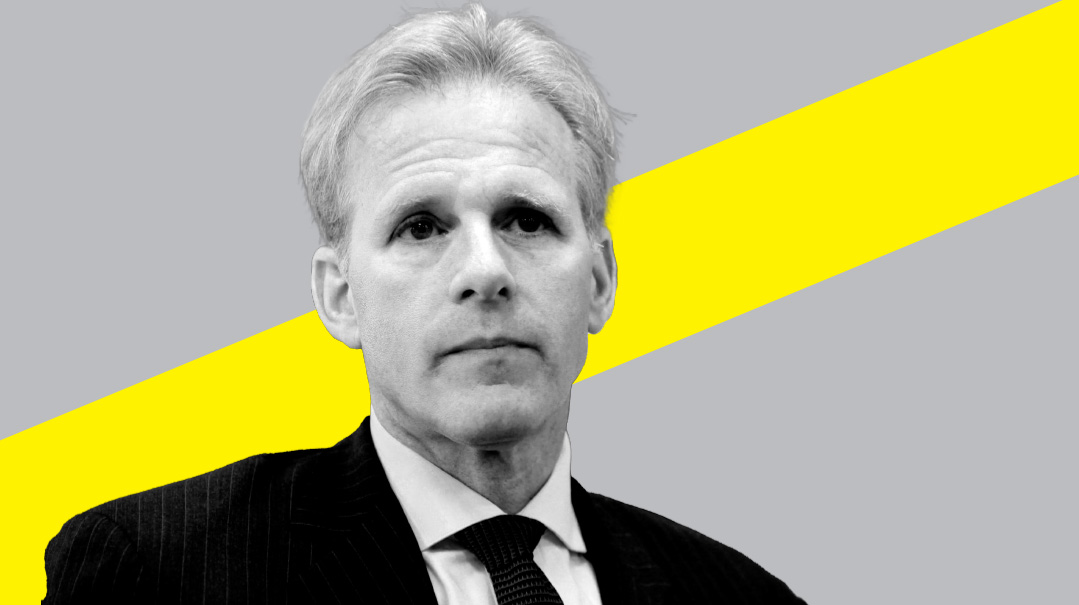A Few Minutes With Mike Freer
| February 6, 2024A slew of threats and attacks induces pro-Israel British MP Mike Freer to leave politics

With Britain gearing up for parliamentary elections this fall, Conservative Mike Freer, a staunchly pro-Israel MP for the Finchley and Golders Green constituency, threw a cat among the pigeons by announcing his intention to stand down, citing concerns for his personal safety and the “intolerable stress” he has experienced. This, even though the polls suggest he would comfortably win the seat again.
Freer, who has been involved in politics for 34 years and an MP since 2010, has been the target of a number of attacks and threats, most recently an arson attack on his constituency office in December that he said was the “final straw.”
In a chilling revelation, police investigating the October 2021 murder of pro-Israel Essex MP Sir David Amess discovered that the murderer, Ali Harbi Ali, had visited Freer’s office in the month prior to killing Amess, although Freer was absent at the time due to a last-minute change of plans. Freer believes he escaped death “by a fluke,” and he and his staff began wearing stab vests at public events.
Prime Minister Rishi Sunak said he was “extremely saddened” by the news, condemning the “vitriolic hatred” that the MP had faced as an attack on British democracy.
As the MP representing the North-West London Orthodox Jewish community, Mr. Freer is regarded as a trusted friend and vocal campaigner for Jewish causes, and is a member of Conservative Friends of Israel (as was David Amess).
Avi Lazarus, CEO of the Federation of Synagogues, recalls the time when, called upon to support the efforts of lobbying group Shechita UK, Freer took a trip to a Staffordshire abattoir to understand the topic firsthand.
“Mike has served our local kehillah with steadfast loyalty, dedication, and personal care for decades,” Lazarus said. “His advocacy in Parliament will be sorely missed.”
We sat down with Mike Freer to discuss his announcement and what it means for the state of politics in the UK.
Your decision to step down has come as a shock. Is this a post–October 7 problem, or has it been building for a while?
It’s a complex question. My decision to step down is not just about my views on Israel or anti-Semitism. Yes, the most serious incidents I have faced have been driven by Islamists, whether it was Muslims Against Crusades or the convicted murderer Ali Harbi Ali. But more broadly, all MPs are suffering increased levels of threats, to the point that we now regard abuse and graffiti as low-level. And it’s that build-up that has eventually gotten to be too much.
You mentioned the October 7 issue. What’s going on there is that it’s developed into a polarized debate in which there’s no center ground. There’s no nuance. If you are for Israel’s right to defend itself and eradicate Hamas, then you’re branded a genocidal baby-killer by those on the other side who don’t share that view. There’s no ability to have a reasoned debate the two.
I understand everyone’s horror at the loss of life in Gaza, but when people push for a cease-fire and you challenge them, saying, “And then what?” — they have no answer.
Another strand here is the role of social media. I went to see the footage of October 7 at a committee room in the House of Commons. I thought to myself, I never want to see that again. I saw things I never wanted to see. But that very clip is available on the Internet — and it shouldn’t be. It desensitizes people’s view of violence and of what is acceptable. It’s a prime example of how the Internet and social media desensitize matters.
Presumably you tried to work with police before you took this drastic step of ending your political career. Were they unwilling to help, or simply unable?
The local police were exceptional. They provided added protection and a significant security upgrade.
Are laws that allow intimidating anti-Israel behavior, such as the weekly Central London marches, too lax? Police don’t seem to be getting on top of them.
People seem to get away with things. The Metropolitan Police have told me that they are reluctant to wade into the big demonstrations to make arrests because they don’t want to spark off a riot. Rather, they rely on analyzing video footage to make arrests post-event.
While I understand that, the public don’t see those arrests and aren’t aware of the consequences. They just see people waving placards that are clearly anti-Semitic and threatening jihad or violence, and see threatening speeches taking place — and nothing happens.
Whether action is taken against them at a later date is academic. People need to see that if you step over that line, you get immediate consequences.
Then the Met told me that they announce arrests on Twitter. Well, I’m not on Twitter — I came off it years ago after having a public spat with George Galloway about anti-Semitism. A lot of my constituents are also not on Twitter and certainly don’t rely on it as their primary source of information.
I appreciate the concerns about not wading into a crowd. But at the end of the day, this is the police, who are trained and equipped to handle a crowd kicking off. They only have to come down hard once or twice for people to realize that if they step out of line, they’ll get arrested on the spot. At the moment, people just get away with it.
I’m old enough to remember the July 1982 bombings in Central London carried out by the IRA, killing 11 military personnel. We would never have tolerated someone walking down the street dressed as an IRA terrorist. They would have been arrested on the spot! And yet now we allow people to walk around the streets dressed as Hamas terrorists as if it’s fancy dress. Visible policing has to be reintroduced.
Do you know of other pro-Israel MPs who have been cowed into silence by the threat of violence?
Not quite, but I do know that all MPs experience threats, regardless of who they are. A female colleague of mine doesn’t allow her kids to use her surname in school because they get picked on.
Some people would say that increasing security for MPs is the solution, but I don’t think more security is the answer. Parliamentary authorities know about every incident that each of the 650 MPs experience, because we report them. I’m meeting with the Speaker of the House to give him the message that we should be publishing every incident from top to bottom, including even low-level graffiti.
My office had a phone call just last week. The caller said, “I know where you guys are, I am coming for you.”
All of these incidents need to brought right out into the open so that the public and the media realize the reality, the scale of the problem, and what MPs are dealing with. Then we can have a proper debate to see what can be done to make sure that this is deemed unacceptable. Putting MPs behind locked doors isn’t the answer.
The Guardian described your decision as “a dark day for politics,” and the Jewish News said you had been “hounded out of politics.” What does it say about modern Britain that even a government minister fears for his safety and can’t speak his mind?
My answer is twofold. Firstly, people read a piece of news on social media and don’t check it — they take it as a given. People need to learn to question what they read. When people just buy into whatever they read, they become entrenched into one narrative and one way of thinking, without considering the possibility of other views, which is dangerous and leads to a partisan society. Separating news from opinion is an important attribute of a thinking mind.
Secondly, we need to change the way we educate people about expressing opinions. Schools need to be teaching that there’s a way to disagree robustly and exchange views and ideas in a respectful way. In a healthy democracy, people agree to disagree. With respectful and calm disagreement, politicians don’t get driven out of a job, because people can accept other people’s point of view, even when it differs from their own.
You have a famous predecessor in your parliamentary seat — Margaret Thatcher. What would she have said about this?
I think she’d be horrified. Mrs. Thatcher was one of the first MPs who really tackled anti-Semitism head-on. There was a local golf club that refused to admit Jewish members. This was sometime in the ’60s or ’70s. She went in, handbag swinging, and told them, “It’s not acceptable, and if you don’t stop it now, I will not step foot over this door again.” They changed their rules.
And she was also one of the first MPs to openly embrace Israel, too. But she’d probably be tougher than me with dissenters; she’d likely have grabbed people by the scruff of their necks and bashed their heads into the wall until they saw sense!
Foreign Secretary David Cameron — formerly the prime minster — has spoken of recognizing a Palestinian state even before a peace deal. Why would the Conservatives effectively reward Hamas terror? Are they going too far?
I have spoken to David about that and I think the headlines lose the nuance. What he’s saying is that if you’re an ordinary Palestinian in Gaza or the West Bank, if you are presented with no hope, no viable alternative, then it’s easy to turn to Hamas. You have to give people a reason to shake off the yoke of Hamas and turn away from radicalization.
I don’t think he was saying that we’ll recognize a Palestinian state next month or even next year. But I do think he was saying that in order to give people hope, you have to set out the conditions on which statehood would be granted. You can’t tell people they’ll never have a Palestinian state, because why would they then turn away from violence?
I think that with the conflict still ongoing, emotions are high and sensitivities are raw, so it’s likely that the finer points of some of his arguments have been lost, quite understandably.
In the 2019 general election, Boris Johnson trounced Jeremy Corbyn in a Conservative landslide that captured many seats long held by Labour. The Conservatives have been on a wild ride since, with the Covid pandemic and a string of political mishaps. Johnson was ousted, Liz Truss came and went in a matter of weeks, and then Rishi Sunak took the helm. Now the polls are predicting a wipe-out for the Conservatives. Is there any hope, and where did it all go wrong?
I disagree. I don’t see a wipe-out. In 1992, Conservative candidate John Major had a surprise win even though the opinion polls in the run-up to the election consistently suggested a narrow Labour majority. Polls are a funny thing, they don’t always get it right.
What I will say is that when my colleagues are campaigning “on the doorstep,” they are not hearing a great love for Labour that would translate into a great switchover in droves come the election. Whereas in 1997 people liked Tony Blair and his messaging, we’re not hearing the same enthusiasm about Keir Starmer.
What my colleagues are hearing is anger with the Conservatives. We have to stop fighting among ourselves and rally around the prime minister, who is a very competent person, and give people the reason to vote for us.
(Originally featured in Mishpacha, Issue 998)
Oops! We could not locate your form.







